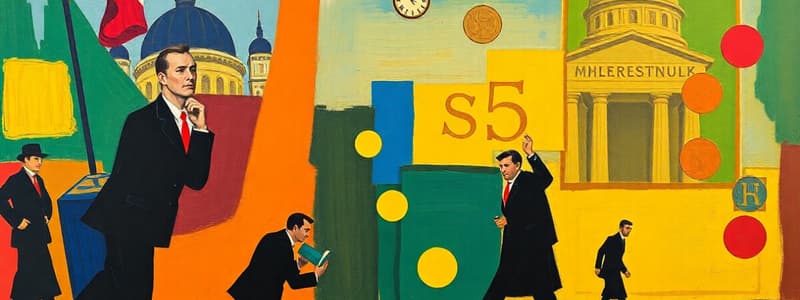Podcast
Questions and Answers
During hyperinflation, why did restaurants stop printing menus?
During hyperinflation, why did restaurants stop printing menus?
- Prices changed so rapidly that menus became outdated before the food arrived. (correct)
- Restaurants wanted to avoid scaring away customers with high prices.
- The government regulated menu prices to combat inflation.
- Paper shortages made printing impossible.
Hyperinflation primarily benefits individuals on fixed incomes, such as those living off pensions.
Hyperinflation primarily benefits individuals on fixed incomes, such as those living off pensions.
False (B)
Why did shops resort to measuring banknotes by weight during hyperinflation?
Why did shops resort to measuring banknotes by weight during hyperinflation?
Counting them took too long
During hyperinflation, people preferred to ______ instead of using money.
During hyperinflation, people preferred to ______ instead of using money.
Which of the following is a typical consequence of hyperinflation?
Which of the following is a typical consequence of hyperinflation?
Match the following individuals with how they were affected by hyperinflation:
Match the following individuals with how they were affected by hyperinflation:
Which of the following was a cause of hyperinflation?
Which of the following was a cause of hyperinflation?
Hyperinflation typically strengthens the middle class and their savings.
Hyperinflation typically strengthens the middle class and their savings.
What was a direct consequence of Germany failing to pay a reparations installment in 1922?
What was a direct consequence of Germany failing to pay a reparations installment in 1922?
The German government primarily financed its war efforts through increased taxation on its citizens.
The German government primarily financed its war efforts through increased taxation on its citizens.
What policy did the German government enact in response to the French occupation of the Ruhr?
What policy did the German government enact in response to the French occupation of the Ruhr?
The agreement that demanded £6,600,000 in reparations from Germany was the Treaty of ______.
The agreement that demanded £6,600,000 in reparations from Germany was the Treaty of ______.
Which of the following was a significant factor that led to hyperinflation in Germany?
Which of the following was a significant factor that led to hyperinflation in Germany?
Hyperinflation in Germany had no effect on the value of the German Mark against foreign currencies.
Hyperinflation in Germany had no effect on the value of the German Mark against foreign currencies.
How did the German government support workers engaging in passive resistance in the Ruhr?
How did the German government support workers engaging in passive resistance in the Ruhr?
What was the main industrial region of Germany occupied by France in 1923?
What was the main industrial region of Germany occupied by France in 1923?
Which of the following is the MOST direct consequence of hyperinflation?
Which of the following is the MOST direct consequence of hyperinflation?
Hyperinflation primarily affects governments and large corporations; individuals are largely unaffected.
Hyperinflation primarily affects governments and large corporations; individuals are largely unaffected.
Why might businesses that rely on consistent income to purchase goods be severely affected by inflation?
Why might businesses that rely on consistent income to purchase goods be severely affected by inflation?
During hyperinflation in Weimar Germany, prices rose so quickly that workers were sometimes paid ________ a day.
During hyperinflation in Weimar Germany, prices rose so quickly that workers were sometimes paid ________ a day.
Match each consequence with the scenario from Weimar Germany's hyperinflation:
Match each consequence with the scenario from Weimar Germany's hyperinflation:
What event directly preceded and exacerbated hyperinflation in Weimar Germany during the early 1920s?
What event directly preceded and exacerbated hyperinflation in Weimar Germany during the early 1920s?
The occupation of the Ruhr by France led to greater availability of goods and food, helping to stabilize prices.
The occupation of the Ruhr by France led to greater availability of goods and food, helping to stabilize prices.
Besides occupation and war reparations, describe one other underlying factor that contributed to hyperinflation in Weimar Germany.
Besides occupation and war reparations, describe one other underlying factor that contributed to hyperinflation in Weimar Germany.
Flashcards
Hyperinflation
Hyperinflation
Rapid and out-of-control increase in prices in an economy.
Bartering
Bartering
Exchanging goods or services directly for other goods or services without using money.
Taking out Loans (during hyperinflation)
Taking out Loans (during hyperinflation)
Borrowing money; advantageous during hyperinflation as the real value of debt decreases.
Pensions (during hyperinflation)
Pensions (during hyperinflation)
Signup and view all the flashcards
Printing Money (Cause of hyperinflation)
Printing Money (Cause of hyperinflation)
Signup and view all the flashcards
Savings Become Worthless (Consequence of hyperinflation)
Savings Become Worthless (Consequence of hyperinflation)
Signup and view all the flashcards
Passive Resistance
Passive Resistance
Signup and view all the flashcards
Terms of Versailles
Terms of Versailles
Signup and view all the flashcards
Inflation
Inflation
Signup and view all the flashcards
Inflation's impact on businesses
Inflation's impact on businesses
Signup and view all the flashcards
Inflation's impact on governments
Inflation's impact on governments
Signup and view all the flashcards
Cause of hyperinflation
Cause of hyperinflation
Signup and view all the flashcards
Hyperinflation in Weimar Republic
Hyperinflation in Weimar Republic
Signup and view all the flashcards
Impact of Ruhr occupation
Impact of Ruhr occupation
Signup and view all the flashcards
Effects of hyperinflation on daily life
Effects of hyperinflation on daily life
Signup and view all the flashcards
The Ruhr
The Ruhr
Signup and view all the flashcards
French Occupation Goal
French Occupation Goal
Signup and view all the flashcards
Passive Resistance (Ruhr)
Passive Resistance (Ruhr)
Signup and view all the flashcards
Worker Support
Worker Support
Signup and view all the flashcards
Hyperinflation Causes
Hyperinflation Causes
Signup and view all the flashcards
Currency Confidence
Currency Confidence
Signup and view all the flashcards
Treaty of Versailles
Treaty of Versailles
Signup and view all the flashcards
Printing Banknotes
Printing Banknotes
Signup and view all the flashcards
Study Notes
- This learning resource discusses how well the Weimar Republic dealt with its problems from 1919-1923, focusing on the Occupation of the Ruhr and Hyperinflation.
Key Words
- Economic: Pertaining to money and financial matters.
- Ruhr: A significant industrial region in Germany.
- Passive Resistance: Non-violent opposition to authority.
- Strike: Refusal to work as a form of protest.
- Inflation: The decrease in the value of money, leading to higher prices.
- Hyperinflation: Extreme, rapid, and out-of-control inflation.
Germany's Economic Problems in 1923
- Germany faced near bankruptcy in 1918 due to World War I costs.
- The Treaty of Versailles worsened the situation by demanding reparations and seizing German industrial territories like the Saar and Silesia.
- In 1921, Allies set reparations at £6.6 billion to be paid yearly.
- Germany struggled with payments by 1922 and requested a reduction.
- Allies declined payment reductions due to their own WWI debts.
- Germany defaulted on its payments to France in January 1923.
Occupation of the Ruhr
- French and Belgian troops occupied the Ruhr legally as a result of the Treaty of Versailles and in response to the default
- The occupation aimed to seize owed resources, including raw materials, manufactured goods, and machinery
- Ruhr produced 80% of Germany's steel and was a hub of industry.
- The German government pursued a policy of passive resistance with striking German workers, stopping production.
- The government supported striking workers financially by printing extra banknotes, worsening hyperinflation.
- The French brought in their own workers, but some Germans sabotaged factories and mines.
- Resistance leaders were imprisoned and deported.
- Violent clashes occurred between the Germans and French forces resulting in over 100 workers killed, and over 100,000 protesters expelled.
- France and Belgium did not withdraw until July 1925 after the Dawes Plan.
Effects of the Ruhr Crisis
- Initially, the Weimar government gained popularity due to its resistance against French and Belgian invaders.
- The passive resistance and strike pay boosted the Weimar Republic's image.
- The German economy, already struggling before 1923, was further damaged by the occupation.
- Germany lost revenue as France and Belgium confiscated products.
- Production halts further damaged the economy, but the government continued to pay striking workers resulting in more money printing.
- Printing more money devalued it, causing inflation.
- Less production coupled with high demand increased value resulting in hyperinflation.
- These events triggered hyperinflation and the collapse of the German currency.
Hyperinflation
- Hyperinflation means out-of-control inflation occurs rapidly
- The occupation of the Ruhr led to significant shortages of goods/food which were rationed and rose prices..
- By November 1923, the German mark was worthless.
- Workers rushed to spend wages immediately due to quickly rising prices.
- Shops weighed notes instead of counting them; some workers were paid twice a day.
- Fuel became cheaper than wood.
- People carried money in wheelbarrows; bartering became common practice.
- A shocking decline in health and increased death rates were noticed in towns.
- Those with fixed incomes/pensions suffered most severely as savings became worthless.
- Middle-class savings disappeared; many businesses went bankrupt.
- Increased middle-class poverty led to support to extremist parties.
- People with loans benefitted from inflation.
- Farmers benefited by growing and trading their own food.
- The wealthy could barter possessions or buy struggling businesses.
Rate of Inflation in Germany (1914-1923)
- July 1914: £1 = 20 marks
- January 1919: £1 = 35 marks
- January 1920: £1 = 256 marks
- January 1921: £1 = 256 marks
- January 1922: £1 = 764 marks
- January 1923: £1 = 71,888 marks
- September 1923: £1 = 1,413,648 marks
- October 1923: £1 = 3,954,408,000,000 marks
- November 1923: £1 = 1,680,800,000,000,000 marks
Inflation
- Inflation is the increase in the average price of goods and services over time
- Governments monitor how inflation rises, usually reported as a percentage.
- Hyperinflation occurs when governments print too much money, causing rapid price increases.
Studying That Suits You
Use AI to generate personalized quizzes and flashcards to suit your learning preferences.




